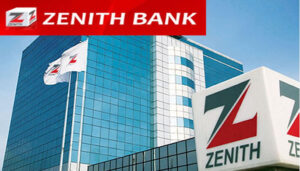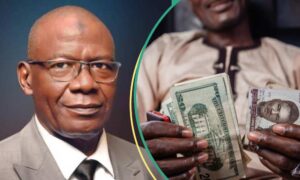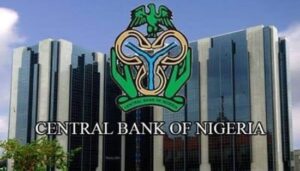
The declining fortune of the naira in the Investors and Exporters (I&E) window is expected to continue this week even as the Central Bank of Nigeria (CBN), in a bid to defend the nation’s currency injected $540 million into the window in July.
Last week, the naira depreciated for the fourth consecutive week in the I&E window, falling by 87 kobo as the indicative exchange rate for the window rose to N363.44 per dollar at the close of business on Friday from N362.57 per dollar the previous week.
Cumulatively, the naira has depreciated by N2.65 against the dollar in the I&E window since the week that ended July 12 when it recorded its last weekly appreciation to N360.79 per dollar.
The depreciation of the naira is driven by increased dollar demand by foreign portfolio investors (FPIs) exiting the nation’s treasury bills due to falling yields, as well as falling crude oil price, which dropped below Nigeria’s budget 2019 benchmark of $60 per barrel last week. In addition was the sharp decline in dollar supply into the I&E window by foreign portfolio investors (FPIs), which fell by 28 percent to $780 million in July from $1.09 billion in June.
Naira depreciation defies $540m CBN intervention
The naira depreciation was in spite of increased intervention of the CBN in the I&E window in July. Data from FMDQ showed that the apex bank injected $540 million into the I&E window in July, in sharp contrast to June and May when the CBN did not intervene in the window.
Meanwhile the CBN last week increased its weekly intervention in the interbank foreign exchange market to $490 million. In addition to the regular weekly injection of $210 million on Tuesday, the apex bank further injected $280.04 million and Chinese Yuan of 28.3 million via the Retail Secondary Market Intervention Sales (SMIS) on Friday.
The increased intervention of the CBN triggered a downward trend in the nation’s external reserve, which dropped further by $190 million as at Thursday last week, to $44.657 billion from $44.847 billion, Thursday of the previous week.
Consequently, the external reserves which recorded the first monthly decline in July, has fallen by $412 million since the end of June. The above scenario, according to analysts will persist this week, leading to further depreciation of the naira in the I&E window. According to analysts at Lagos based Cowry Assets Management Company, “In the new week, we expect depreciation of the naira against the dollar across the market segments despite CBN sustained special interventions given the fear of further crash in crude oil price.”
Analysts project lower inflation rate for July
Analysts have projected that the inflation rate dropped for the second consecutive month in July but ruled out the possibility of the inflation rate dropping to single digit inflation before the end of the year. Their projection is coming ahead of the July inflation data scheduled to be released this week by the National Bureau of Statistics (NBS). After rising for two months, the inflation rate dropped in June to 11.22 percent from 11.4 percent in May, driven by moderation in food inflation, due to the impact of the harvest season on prices of food items. Analysts at Lagos based Financial Derivatives Company (FDC), projected that this trend persisted in July, with inflation rate falling to 10.98 percent.
They said: “We are forecasting that the headline inflation in July will slide to 10.98 percent from 11.22 percent in June. If accurate, it will be the lowest level since January 2016. The moderation in the general price level would be largely underpinned by lower food inflation due to favourable harvest. Our forecast also points to a 0.16 percent decline in the month-on-month inflation to 0.91 percent (11.50 percent annualized). During our survey in July, we noticed that the prices of most of the commodities in the food basket declined.
“Even though the projection means the CBN will be closer to achieving its inflation rate of 6-9 percent target, the probability that headline inflation will fall below 10 percent and stay there is unlikely at this point in time. This is because the economy will be impacted by the high liquidity resulting from the payment of the new minimum wage to grade 1-4 workers as well as the CBN’s effort to boost lending to the private sector.”
Similarly, analysts at Lagos based FSDH Merchant Bank FSDH projected further decline in the inflation rate to 11.01 percent, also citing impact of the harvest season. They said: “FSDH Research expects the July 2019 inflation rate to drop to 11.01 percent from 11.22 percent recorded in June 2019, thanks largely to the harvest season. “If our prediction is correct, this will be the second consecutive month for the inflation rate to have dropped and the lowest inflation rate recorded in Nigeria since February 2016.
“The inflation rate target of the Central Bank of Nigeria (CBN) is between six percent and nine percent. As noted in our previous inflation reports, it is unlikely that Nigeria will achieve a single-digit rate of inflation in the short-term.
“We must also note that an increase in the inflation rate is not entirely bad, as a reasonable increase in general prices is important to encourage production. No manufacturer will be encouraged to produce in an environment when the prices of the goods that are produced are going down. What most countries and central banks are guarding against is an excessive increase in general prices.”
You may be interested

Arsenal Equal Chelsea’s London Derby Feat After 5-1 Win Vs Palace
Webby - December 21, 2024Arsenal equaled Chelsea’s London derby achievement following their 5-1 win against Crystal Palace in Saturday’s Premier League game at Selhurst…

Haaland Backs Guardiola To Turn Man City’s Poor Form Around
Webby - December 21, 2024Erling Haaland had said he and his Manchester City teammates are still backing manager Pep Guardiola to turn the team’s…

PSG To Reignite Interest In Osimhen
Webby - December 21, 2024Paris Saint-Germain have contacted Napoli to discuss signing Victor Osimhen in January, according to reports in France.It is reported that…





















![American Pastor, David Wilson Seen Eating The Box Of Woman Who Isn’t His Wife [Video]](https://onlinenigeria.com/wp-content/uploads/2019/10/american-pastor-david-wilson-seen-eating-the-box-of-woman-who-isnt-his-wife-video-150x150.jpg)









